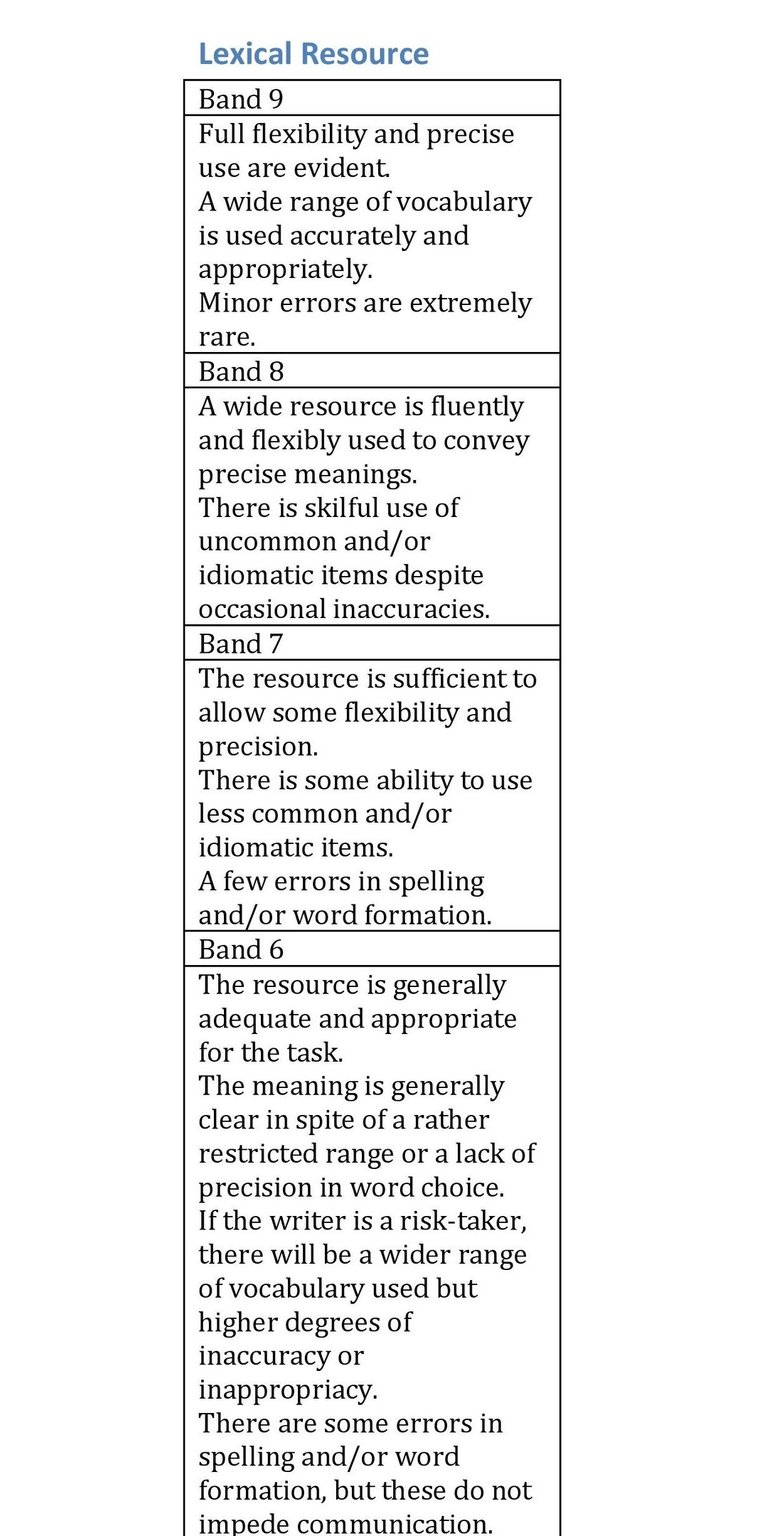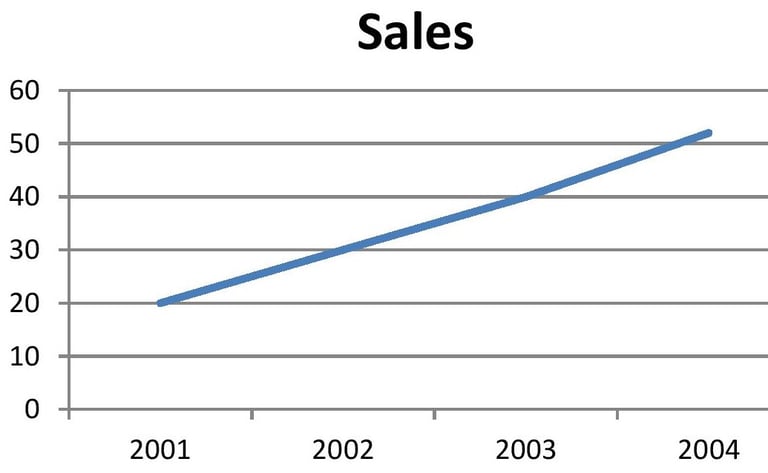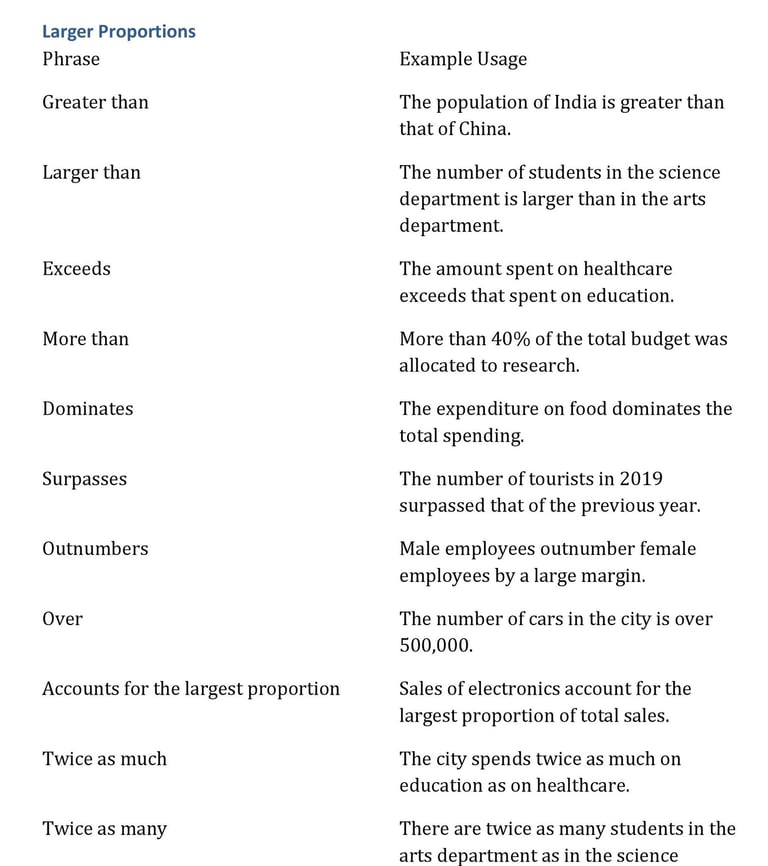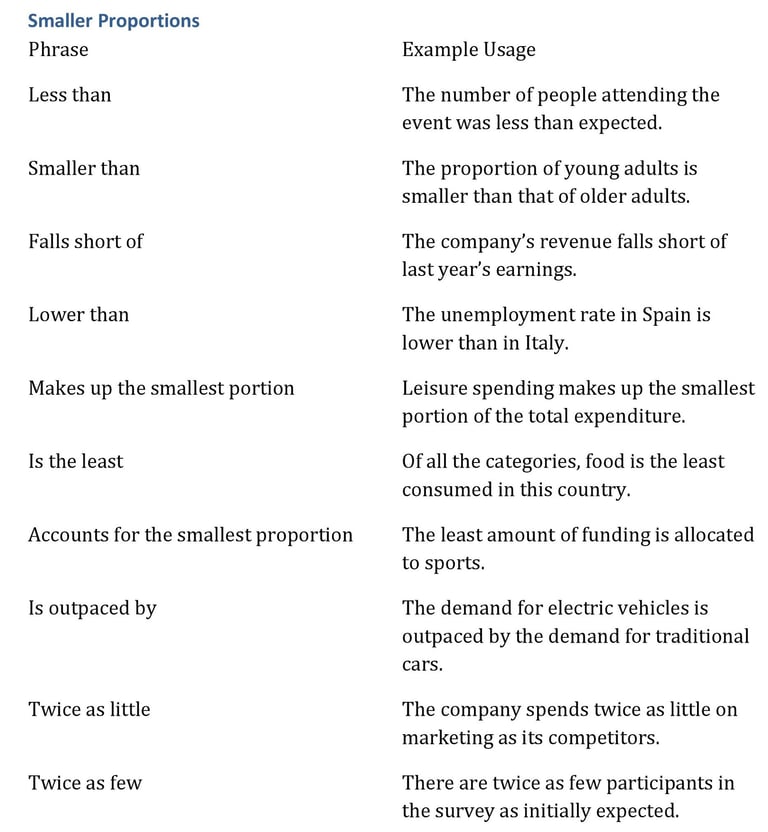Lexical Resource: Enhancing Vocabulary for IELTS Writing Task 1
Unlock the key to a higher IELTS Writing Task 1 score! This post reveals essential vocabulary tips to help you describe data, trends, and comparisons with precision. Learn how to vary your language and boost your lexical resource for clearer, more effective writing. Don't miss out—improve your score today!
IELTS WRITING TASK 1
4/6/20253 min read
🌈 Lexical Resource
Lexical resource can be divided into two parts:
1. Vocabulary you need to know for writing IELTS Writing Task 1, to analyze any numerical data or chart
2. Vocabulary that is topic specific
💡 While there is no quick and easy fix for the latter, the former can easily be mastered.
Navigation
📝 Band Description
🔄 Represent
📊 Percentage
🔍 Show Approximation
🔁 Alternatives to "Show"
🔠 Change the Form
⚖️ Comparisons
📈 Verbs Describing Change
📉 Words for Increase
⛰️ Describing the Peak
📉 Words for Decrease
🌊 Describing the Trough
🔄 Words for Fluctuation
📅 Words for No Change


The band descriptors for Lexical Resource in Academic IELTS Writing Task 1, taken from IELTS British Council.
As you can see, using strong vocabulary is extremely important for your overall score.
🔵 Represent
In any chart, you will be given a category and the figures related to that category. You need to show the relationship between two things.
📌 “Pakistan accounted for 50% of all students in the survey.”
Other words:
🟣 make up
🟢 represent
🔴 contribute
🟡 Percentage
Most of the time you will be given a percentage to work with. Rather than keep mentioning percentages, use the following words:
20% = one-fifth, every fifth passenger
25% = one-quarter
50% = half
75% = three-quarters
🧠 Examples in Sentences:
20% of respondents = ✅ Every fifth respondent said yes.
75% of sales = ✅ Three-quarters of all sales occurred in the final quarter.
50% = ✅ Half of the items were sold.
🟢 Show Approximation
In charts, you won’t always be given exact numbers. You need to show approximation:
🔹 approximately
🔹 about
🔹 around
🔹 roughly
➡️ Around 10 million units were sold.
🧭 We can say: “The sales reached about 50% in 2004”
But that could mean: 48%, 49%, 51%, or 52%.
✅ A better sentence: “The sales reached just over 50% in 2004.”
Useful Phrases:
✅ just over, slightly more than
✅ just under, slightly less than


🔷 “Show” Alternatives
Most IELTS prompts start with:
“The table shows…” or “The chart shows…”
You can replace show with:
📌 illustrate
📌 depict
📌 display
📌 provide information about
🔶 Change the Form
The verb form and noun form of the same word count as two separate vocabulary items in IELTS.
Example:
📊 The bar chart shows the growth of sales from 2000 to 2010.
🔁 The bar chart illustrates how sales grew from 2000 to 2010.
🔴 Comparisons
Charts will have some proportions bigger or smaller than others. You need to express that clearly.




🔺 Verbs Describing Change
You should not always use "increase" or "decrease". Learn a range of expressions!
🔼 1. Words for Increase:
rise, grow, climb, surge, soar
📝 Examples:
"The number of students rose significantly in 2020."
"Sales surged during the holiday season."
⭐ Describing a Peak
🟢 peak – To reach the highest point
📝 "The number of visitors peaked in August."
As a noun:
"The number of visitors reached its peak in August."
"The peak of visits was reported in August."
🟢 hit a high – To reach the highest level
"The unemployment rate hit a high in the summer."
💬 It hit a high of 17.5 percent four years ago. (New York Times)
🔽 2. Words for Decrease:
fall, drop, decline, dip, plummet, slump, diminish, shrink, lessen, weaken
📝 Examples:
"The temperature dropped sharply last night."
"The number of accidents declined over the past decade."
⬇️ Describing the Trough (Lowest Point):
🔻 plummet – To fall dramatically
📝 "In the final quarter, the sales figures plummeted, dropping by 40%."
🔻 hit a low – To reach the lowest level
📝 "The birth rate hit a low in 2010, reaching its lowest point in decades."
🔁 3. Words for Fluctuation (Up and Down):
fluctuate, vary, oscillate, alternate, swing, shift, undulate, hover
📝 Examples:
"The stock prices fluctuated throughout the year."
"The population oscillated between 100,000 and 150,000."
⏸️ 4. Words for No Change:
remain steady, stabilize, level off, stay the same, plateau, remain constant, hold steady
📝 Examples:
"The interest rate stabilized after a sharp rise."
"The population of the city remained constant for the last five years."
Resources
SUPPORT
+923184813655
© 2025. All rights reserved.
📍 RTS (Rise To Succeed), Near Erum Bright Academy, Daro Road, Dadu
